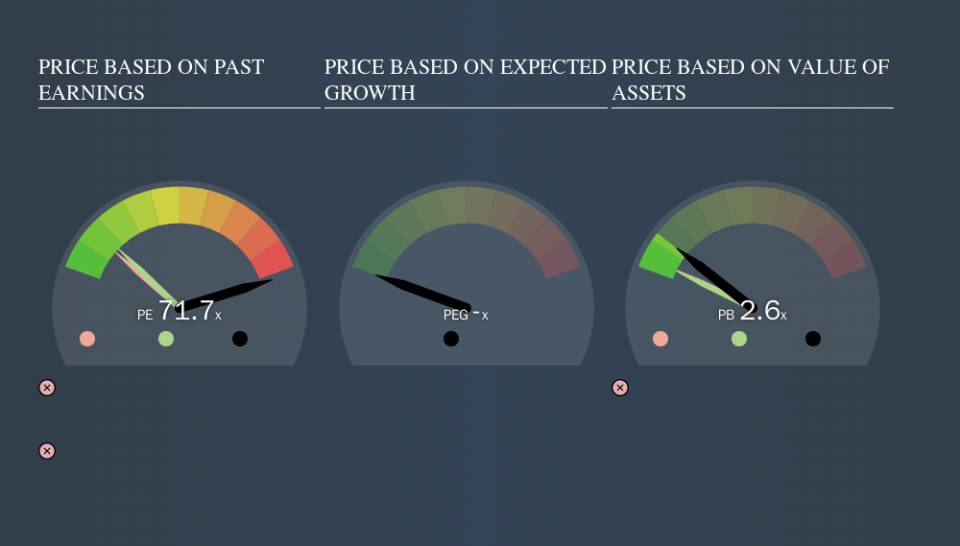How Does Prosperous Industrial (Holdings)'s (HKG:1731) P/E Compare To Its Industry, After Its Big Share Price Gain?

Prosperous Industrial (Holdings) (HKG:1731) shares have continued recent momentum with a 62% gain in the last month alone. That brought the twelve month gain to a very sharp 96%.
Assuming no other changes, a sharply higher share price makes a stock less attractive to potential buyers. In the long term, share prices tend to follow earnings per share, but in the short term prices bounce around in response to short term factors (which are not always obvious). The implication here is that deep value investors might steer clear when expectations of a company are too high. Perhaps the simplest way to get a read on investors' expectations of a business is to look at its Price to Earnings Ratio (PE Ratio). Investors have optimistic expectations of companies with higher P/E ratios, compared to companies with lower P/E ratios.
View our latest analysis for Prosperous Industrial (Holdings)
How Does Prosperous Industrial (Holdings)'s P/E Ratio Compare To Its Peers?
We can tell from its P/E ratio of 71.70 that there is some investor optimism about Prosperous Industrial (Holdings). You can see in the image below that the average P/E (9.0) for companies in the luxury industry is a lot lower than Prosperous Industrial (Holdings)'s P/E.
Prosperous Industrial (Holdings)'s P/E tells us that market participants think the company will perform better than its industry peers, going forward. Shareholders are clearly optimistic, but the future is always uncertain. So further research is always essential. I often monitor director buying and selling.
How Growth Rates Impact P/E Ratios
If earnings fall then in the future the 'E' will be lower. That means even if the current P/E is low, it will increase over time if the share price stays flat. Then, a higher P/E might scare off shareholders, pushing the share price down.
Prosperous Industrial (Holdings) saw earnings per share decrease by 62% last year. And it has shrunk its earnings per share by 23% per year over the last five years. This could justify a pessimistic P/E.
A Limitation: P/E Ratios Ignore Debt and Cash In The Bank
One drawback of using a P/E ratio is that it considers market capitalization, but not the balance sheet. Thus, the metric does not reflect cash or debt held by the company. In theory, a company can lower its future P/E ratio by using cash or debt to invest in growth.
While growth expenditure doesn't always pay off, the point is that it is a good option to have; but one that the P/E ratio ignores.
How Does Prosperous Industrial (Holdings)'s Debt Impact Its P/E Ratio?
Prosperous Industrial (Holdings) has net cash of US$37m. This is fairly high at 13% of its market capitalization. That might mean balance sheet strength is important to the business, but should also help push the P/E a bit higher than it would otherwise be.
The Bottom Line On Prosperous Industrial (Holdings)'s P/E Ratio
With a P/E ratio of 71.7, Prosperous Industrial (Holdings) is expected to grow earnings very strongly in the years to come. The recent drop in earnings per share might keep value investors away, but the net cash position means the company has time to improve: and the high P/E suggests the market thinks it will. What is very clear is that the market has become significantly more optimistic about Prosperous Industrial (Holdings) over the last month, with the P/E ratio rising from 44.1 back then to 71.7 today. For those who prefer to invest with the flow of momentum, that might mean it's time to put the stock on a watchlist, or research it. But the contrarian may see it as a missed opportunity.
Investors have an opportunity when market expectations about a stock are wrong. As value investor Benjamin Graham famously said, 'In the short run, the market is a voting machine but in the long run, it is a weighing machine. We don't have analyst forecasts, but shareholders might want to examine this detailed historical graph of earnings, revenue and cash flow.
But note: Prosperous Industrial (Holdings) may not be the best stock to buy. So take a peek at this free list of interesting companies with strong recent earnings growth (and a P/E ratio below 20).
We aim to bring you long-term focused research analysis driven by fundamental data. Note that our analysis may not factor in the latest price-sensitive company announcements or qualitative material.
If you spot an error that warrants correction, please contact the editor at editorial-team@simplywallst.com. This article by Simply Wall St is general in nature. It does not constitute a recommendation to buy or sell any stock, and does not take account of your objectives, or your financial situation. Simply Wall St has no position in the stocks mentioned. Thank you for reading.


